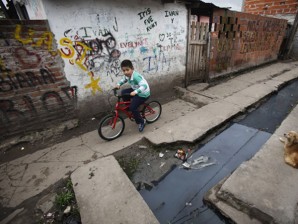Slumdwellers explain Argentina’s politics

VOTE RICH. In this Oct. 13, 2011 photo, a boy rides his bicycle along a sewage canal in La Cava shanty town in Buenos Aires, Argentina. (AP Photo/Victor R. Caivano)
BUENOS AIRES, Argentina— Surrounded by some of Argentina’s most expensive real estate, “La Cava” is an exposed sore of tin-roofed shacks and open sewers crowded with 10,000 people. But when it comes to Argentine politics, it is the residents of this “misery village” who best describe why their incumbent president is most likely to win in a landslide vote Sunday.
President Cristina Fernandez de Kirchner, they say, is the only one of the eight candidates who seems even remotely capable of making their lives less miserable.
While her rivals have gone negative, Fernandez, 58, is talking about “utopia” and can cite real achievements: She and her late husband and predecessor, Nestor Kirchner, have put more money in the pockets of the poor and created more social programs to help them than any leader since Argentina’s seminal populist strongman, Juan Domingo Peron, and his wife Evita. Since the Kirchners took office in 2003, poverty rates have plummeted.
“I’m going with Cristina. She gives me confidence. The others all seem untrustworthy,” said Carina Cisterna, 30, who thanks the president for the child welfare payments that have given her just enough money to afford a nearby 10-000 peso ($2,350) shack of her own.
La Cava residents complain bitterly about the inflation eating up their meager incomes, but they say it would be much worse if not for the 270 pesos ($63.50) a month they get for keeping each child in public school — a $3 billion program that Fernandez created by presidential decree.
Article continues after this advertisement“These are things that the government does so that it can say it’s doing something, but in reality, a child welfare payment is not a long-term program. And we don’t know how long it’s going to last,” said Susana Flores, a mother of four who arrived in the slum 18 years ago.
Article continues after this advertisementThe social spending depends on revenues now expected to decline sharply in 2012 — money from windfall commodities taxes, the nationalized pension system and central bank reserves used to reduce foreign debt. While Argentina’s current 8 percent growth leads the region, the International Monetary Fund is predicting a sharp slowdown.
The president’s rivals complain that her spending spree has overly exposed Argentina to the looming global crisis.”We are dancing happily on the Titanic,” former president Eduardo Duhalde warned as he closed his campaign. “It’s no longer tolerable, this official story that paints for us a marvelous country and hides the inflation.”
Inflation does remain a huge threat, said Flores’ father, Luis Alfonso Flores, who runs a small grocery store in La Cava. He updates a list of prices he writes neatly on a piece of notebook paper every 10 days to keep up with the wholesalers. His records suggest that prices are rising much faster than the government admits, closer to the 24 percent annual rate that would challenge Venezuela for the worst inflation in Latin America.
“The people don’t have the same money,” says his daughter, gesturing beyond her crowded dining room, where she was serving a traditional “puchero” stew to her extended family. She recalled that La Cava people used to grill steaks every weekend. “Before, there was smoke all over the place. Now there’s hardly any. At 200 to 300 pesos ($50-75) for a barbecue, now you just can’t do it.”
But the polls suggest — and La Cava’s residents agree — that nobody else seems willing or able to do more than Fernandez to keep the economy from falling apart.
“People are voting for economic stability,” explained Mariel Fornoni, who directs the Management & Fit consulting firm.
Fernandez has increased retiree pensions and last month raised the minimum wage by 25 percent to $541 a month, Latin America’s highest.
In contrast, her opponents failed to offer coherent visions for the future and fell into distracting disputes between them, pollsters say.
None of the president’s rivals polled higher than 17 percent in recent surveys. Fernandez needs just 45 percent to win outright on Sunday, and can avoid a runoff even if she receives as little as 40 percent if her rivals trail by more than 10 percentage points. The error margins of these polls were less than 3 percent.
La Cava sprang up in 1946, when the government dug a huge pit to extract red clay for bricks. Water flooded in, and then people. Their poverty became much worse during the 1976-1983 dictatorship and again after Carlos Menem’s 1990s administration left the economy in tatters.
But since the Kirchners’ took over, poverty levels have dropped from 54 percent in 2003 to 8 percent this year, according to the government’s INDEC statistics service.
Artemio Lopez, who directs the Consultora Equis firm, says his calculations suggests a 21 percent poverty rate among the country’s 40 million people. But he said the Kirchner era has seen the longest period of improvement since Argentina recovered its democracy.
Associated Press Writer Almudena Calatrava contributed to this report. Michael Warren can be reached at www.twitter.com/mwarrenap